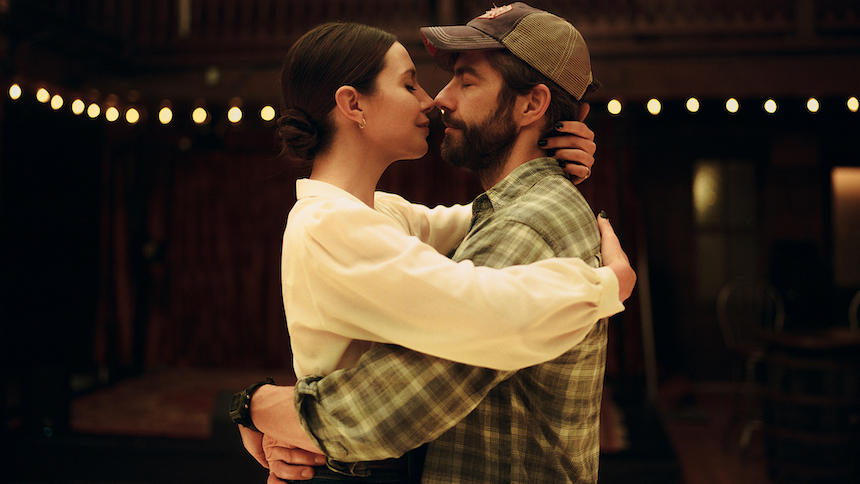THE NATURE OF LOVE Review: A Tale of Romance, Philosophy and the Power of Classic Love Ballads
Magalie Lépine-Blondeau and Pierre-Yves Cardinal star in French-Canadian writer-director-actor Monia Chokri's sexy new film.

Sophia (Magalie Lépine Blondeau) and her husband Xavier (Francis-William Rhéaume) are spending the evening with their friends, talking and joking about philosophy, Jean-Jacque Rousseau and universal human values.
On their way home, Sophia and Xavier discuss their friends’ penchant for fighting and having makeup sex, with Xavier proclaiming he’d much prefer not to fight at all even at the expanse of passion. Sophia, meanwhile, is worried she wouldn’t know what to talk about with a contractor they hired for their cabin in the woods whom she’s meeting tomorrow.
She needn’t worry. Sylvain (Pierre-Yves Cardinal) talks a mile a minute for both of them, mostly about what a colossal mistake they’ve made by purchasing a property that requires that much work. He also takes her out to a local bar to ease the pain where she translates some Scorpions lyrics for him. Later, the two are obviously bound to have sex on the floor.
This is the start of The Nature of Love (originally titled Simple comme Sylvain), Monia Chokri’s latest film that simultaneously ponders some uncomfortable questions about class divide, prejudice, modern society and, well, love. To fully enjoy Chokri’s work that premiered last year at the Cannes Film Festival, it’s probably best to know in advance that, despite what it may look like, this film is not a romantic comedy, nor is it a social drama.
It's more like a study on some tough matters of life. That said, the film is very aware of romcom conventions, as the authors genially spoof and deconstruct them.
More than anything, Chokri seems to be fascinated with dissecting the notion of “happily ever after” and what might happen to amorous couples after the credits roll. The Nature of Love has two major examples of that – first, in Sophia and Xavier, then – with Sophia and Sylvain. One is a pair with great partnership and banter that can make a conversation about autocrative dictators seem flirty, but no real passion (they are basically Carrie and Berger).
By contrast, Sophia and Sylvain have all the passion, and their discussions on classic love ballads are pretty solid too, but the second they venture outside their own private bubble and into their mutual social circles, there is this great divide they are both uncomfortably aware of. There are other versions of HEA too; the movie is actually brimming with couples of all ages, all mirroring each other, all less than perfect in their own unique way.
For all the film’s intricacy, Chokri – both the director and screenwriter here (and who also plays one of the roles) – sometimes seems to rely on easy solutions and leans too much into stereotypes. For instance, Sophia and her friends don't really need to be academics to make the cultural gap here obvious, even though it does present a nice opportunity for Sophia's running commentary on different views on love with quotes from Plato and Schopenhauer. Similarly, Sylvain and his family don't really have to be self-proclaimed "rednecks" who talk about UFOs and are prone to racist remarks.
The cinematography is generally beautiful and creative but some visual choices also come off as excessive, like a conversation shot through a windshield in such a way that one person’s face is obscured. Other times, there are details that might seem too on the nose but are fun in a self-aware way: like a scarlet red phone that actively tries to prevent Sophia’s first foray into adultery.
None of the above puts the movie down though, or make it any less entertaining. The language, both literal and cinematic, is rich and elegant, and Chokri manages to maintain a sexy, light-hearted tone even when things are rather grim. There are hints of another great French Canadian poet of the complicated (i.e. shitty) human nature: Xavier Dolan, here and there, especially since Monia Chokri, Magalie Lépine Blondeau and Pierre-Yves Cardinal all appeared in his films before.
The underlying theme of the general alienation and impossibility of communication is also reminiscent of Michelangelo Antonioni’s works, specifically in the episodes where characters talk simultaneously over each other or just aren’t hearing what the other person is saying. The miscommunication isn’t seen as a social or cultural issue here but an existential one, as demonstrated when pretty much everyone here struggles to form an actual connection.
Unlike a typical romcom narrative, Chokri’s film doesn’t offer recipes or remedies – it just states the fact in a surprisingly upbeat and entertaining way. Who knows what Plato or Schopenhauer would say on the matter, but Antonioni would definitely approve.
The film is now playing at the IFC Center in New York, and opens Friday, July 12, at Laemmle Royal in Los Angeles, with a national rollout to follow, via Music Box Films.







